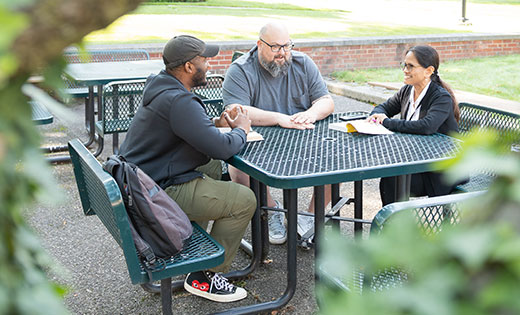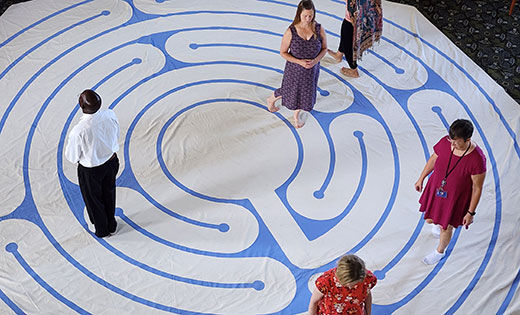Hybrid Doctor of Ministry in Christian Spirituality
Hear from Our Faculty
Careers in Christian Spirituality
Graduates of the Christian spirituality degree program serve in a wide range of professional ministry roles, including pastors, counselors, spiritual advisors, and spiritual directors. They lead faith development, discernment, and prayer practices in congregations, community ministries, group retreats, and other settings with the goal to guide others toward a greater appreciation of God’s presence.
Program Details
From admissions requirements to tuition information and course topics, find what you need to begin your journey in the Christian spirituality program.
How to Apply
PTS accepts applications for the Doctor of Ministry in Christian Spirituality degree program on a rolling basis. Due to limited cohort spots, we encourage applicants to apply early for the best chance of admission. If the cohort reaches capacity, applicants can request placement on a waitlist. Ready to apply? Review admission requirements for the D.Min. degree.
To learn more about the application process and how the Christian spirituality program fits your calling, e-mail or call 412-924-1365.
Application Deadlines
Priority Deadline: Dec. 5, 2025
Final Deadline: April 17, 2026
Prerequisites
For program eligibility, applicants must hold a Master of Divinity (M.Div.) or an accredited master's degree in a field related to their ministry context.
Cost and Financial Aid
At PTS, we offer a high-quality theological education at a cost of attendance that’s accessible to working pastors and ministry leaders. Eligible students may also receive financial aid and scholarship awards through the Doctor of Ministry program.
Note: Federal loans are not available for this program.
Course Topics
Introduction Christian Spirituality: Traditions, Contexts, Practices
Explore Christian spirituality through a historical, biblical, practical, and contextual lens. Through this introductory course, students also learn core spiritual disciplines and how to develop and keep a rule of life.
Research Methods Seminar
Gain foundational research skills necessary for academic work, specifically in ethnography and research methods. Students also have the opportunity to explore a research question that may become the topic of their D.Min. final project.
The Ministry of Spiritual Direction
Study the practical nature of spiritual direction across historical and theological contexts and in diverse communities. Develop deep listening skills and learn how to ask formative questions by participating in practice spiritual direction sessions.
The Ministry of Spiritual Formation/Teaching and Leading Spiritual Practices
Explore the art and practice of leading spiritual formation experiences, implementing corporate spiritual disciplines, and teaching prayer, while examining how spiritual formation differs across cultural contexts. Students also attend workshops in which they practice leading prayer.
Spirituality, Church, and World
Understand the relationship between Christian spirituality, spiritual formation, and the church’s ministry in the world as it relates to questions of justice and tradition. Students will engage in biblical and theological reflection and may relate course themes to public Christian figures such as Julian of Norwich, Pauli Murray, and Howard Thurman.
Deep Listening/Psychological Concepts for Spiritual Direction and Spiritual Formation
Enhance the practice of listening through psychological concepts important for ministry. The course covers topics such as human and faith development, addiction, professional boundaries, and when to refer.
Spirituality and Discipleship in the Gospels
Examine biblical accounts of Christian spirituality, spiritual formation, and discipleship through a close study of the Gospels. Learn how cultural context shapes the way we read and interpret the Bible, and explore how the Gospels influence subsequent Christian spiritual traditions.
Practicing Discernment Together
Study the topic of discernment in Christian spirituality and its various expressions in the spiritual traditions across diverse cultures. This course introduces students to the practices of discernment in a variety of ministry contexts and the art of leading and teaching discernment in groups and one-on-one settings.
Protestant Spiritual Traditions
Learn about the theology, development, and spiritual practices of several major Protestant spiritual traditions, including Lutheran, Reformed, Anglican (including Wesleyan), and Anabaptist. Students explore how culture and context shape these traditions.
African American Christian Spirituality
Discover the expressions of Christian spirituality in African American Christian traditions, and relate those expressions to the ministries of spiritual direction and formation.
Christian Spirituality Final Project
Students in the Christian spirituality program must complete a doctoral project and paper that demonstrates their ability to identify a problem, issue, or concern in their own ministry, integrate appropriate theological, biblical, and professional resources, and develop a method for resolution.
The doctoral project and paper must reflect depth of theological insight and its positive integration with the practice of ministry.
Current Cohort Schedule
| Date | Class |
|---|---|
| June 17-21, 2024 | DM701 Christian Spirituality: Traditions, Contexts, Practices Amy Oden, Ph.D. Professor of Early Church History and Spirituality Saint Paul School of Theology |
| June 24-28, 2024 | DM711 Introduction to Research Methodology Deirdre Hainsworth, Ph.D. President, Techtelos |
| Jan. 13-17, 2025 | DM792 Spirituality of Howard Thurman Luther E. Smith, Jr., Ph.D. Professor Emeritus of Church and Community Emory Chandler School of Theology |
| Jan. 20-24, 2025 | DM721 Ministry of Spiritual Direction Amy Oden, Ph.D. Professor of Early Church History and Spirituality Saint Paul School of Theology |
| June 2-6, 2025 | DM761 Spirituality/Discipleship/Gospels Tucker Samson Ferda, Ph.D. Associate Professor of New Testament, PTS |
| June 9-13, 2025 | DM752 Discernment and the Compassion of God Frank Rogers, Jr., Ph.D. Muriel Bernice Roberts Professor of Spiritual Formation and Narrative Pedagogy Claremont School of Theology |
| Jan. 5-9, 2026 | DM731 Ministry of Spiritual Formation Diane Walton Hendricks, D.Min. |
| Jan. 12-16, 2026 | DM772 Thomas Merton: Monk, Poet and Social Critic L. Roger Owens, Ph.D. (Faculty Mentor) Hugh Thomson Kerr Professor of Pastoral Theology, PTS |
| June 15-19, 2026 | DM742 Spiritual Formation/Global Perspective Cindy Lee, Ph.D. Affiliate Assistant Professor Fuller Theological Seminary |
| June 22-26, 2026 | DM781 Protestant Spiritual Traditions Kenneth Woo, Ph.D. Assistant Professor of Church History, PTS |
| Independent Study | DMCSFP Christian Spirituality Final Project (6 Credits) |
Frequently Asked Questions (FAQs)
As you consider your next step, review the following FAQs to learn more about the Christian spirituality program’s coursework and certificate options.
What are classes like in the Christian spirituality program?
Each course is designed to:
- Engage students in biblical and theological reflection.
- Make space for students to practice prayer and reflect on their own lives of prayer.
- Attend to how the subject matter of the course is shaped by culture and context and takes diverse expressions.
- Provide opportunities for students to relate the subject matter of the course to their own ministry contexts or to the ministries of spiritual direction and spiritual formation.
How do I earn a certificate along with the D.Min. in Christian Spirituality degree?
Students may choose to pursue a certificate in Spiritual Direction in Ministry or Leading Spiritual Formation as part of their Doctor of Ministry in Christian Spirituality degree.
To prepare, all students must begin meeting one-on-one with a spiritual director before Intensive II and continue throughout the program. We strongly encourage students to have experience with one-on-one spiritual direction prior to enrollment.
After Intensive II, students pursuing a certificate will engage in one of the following ministry tracks with bi-monthly distance peer-supervision sessions:
- Spiritual Direction in Ministry: Monthly meetings with at least two directees beginning after Intensive II and continuing for 18 months, with nine peer-supervision sessions.
- Leading Spiritual Formation: Monthly leadership of spiritual formation (or equivalent—leading a retreat would count as two months of spiritual formation) beginning after Intensive II and continuing for 18 months, with nine peer-supervision sessions.
Students may choose to earn a Doctor of Ministry in Christian Spirituality degree without pursuing a certificate. In this case, students will still participate in all practice sessions and complete the D.Min. final project but will not engage in peer-supervised ministry.
Learn More About Pittsburgh Theological Seminary’s Christian Spirituality Program
Deepen your spiritual life, strengthen your ministry, and grow in your capacity to guide others in prayer and discernment with Pittsburgh Theological Seminary’s hybrid Doctor of Ministry in Christian Spirituality degree program. Apply today!





